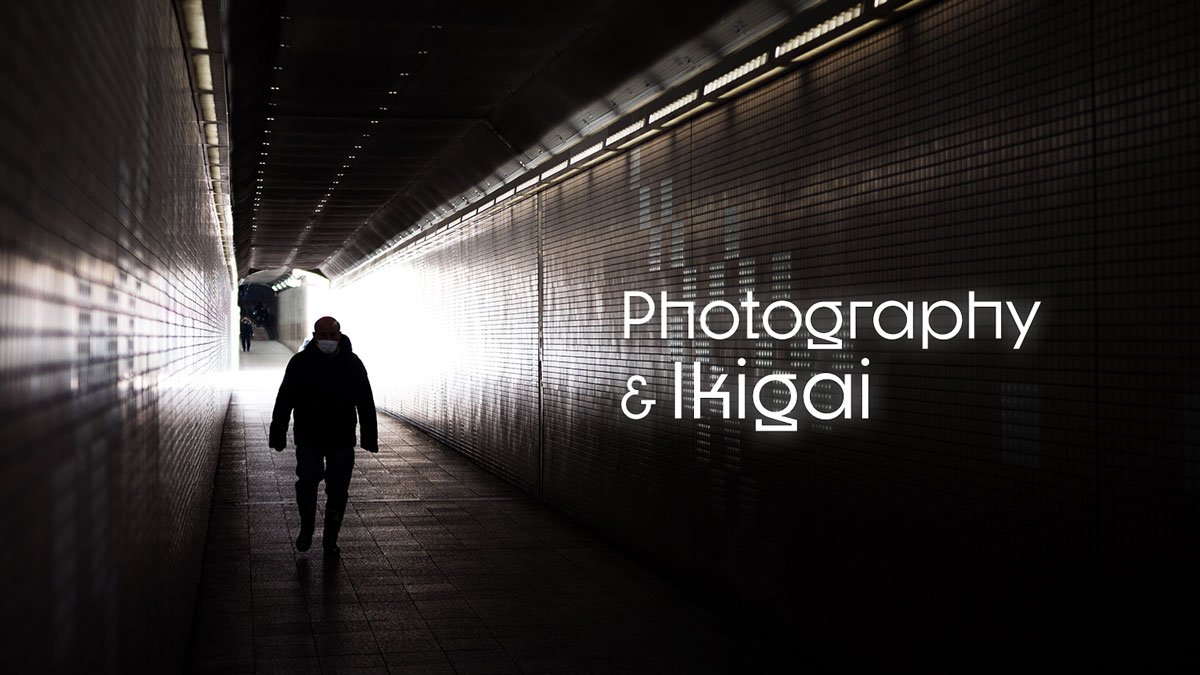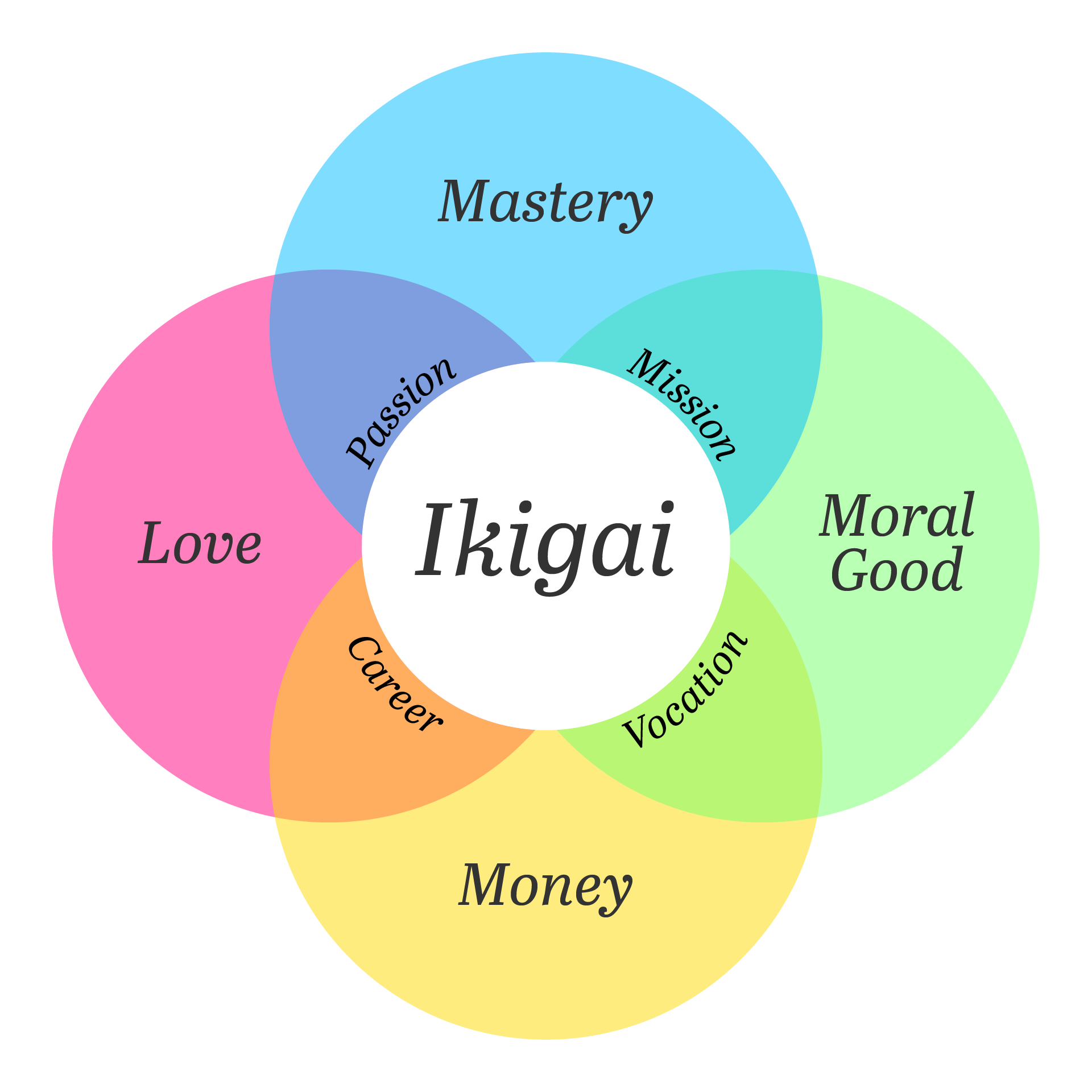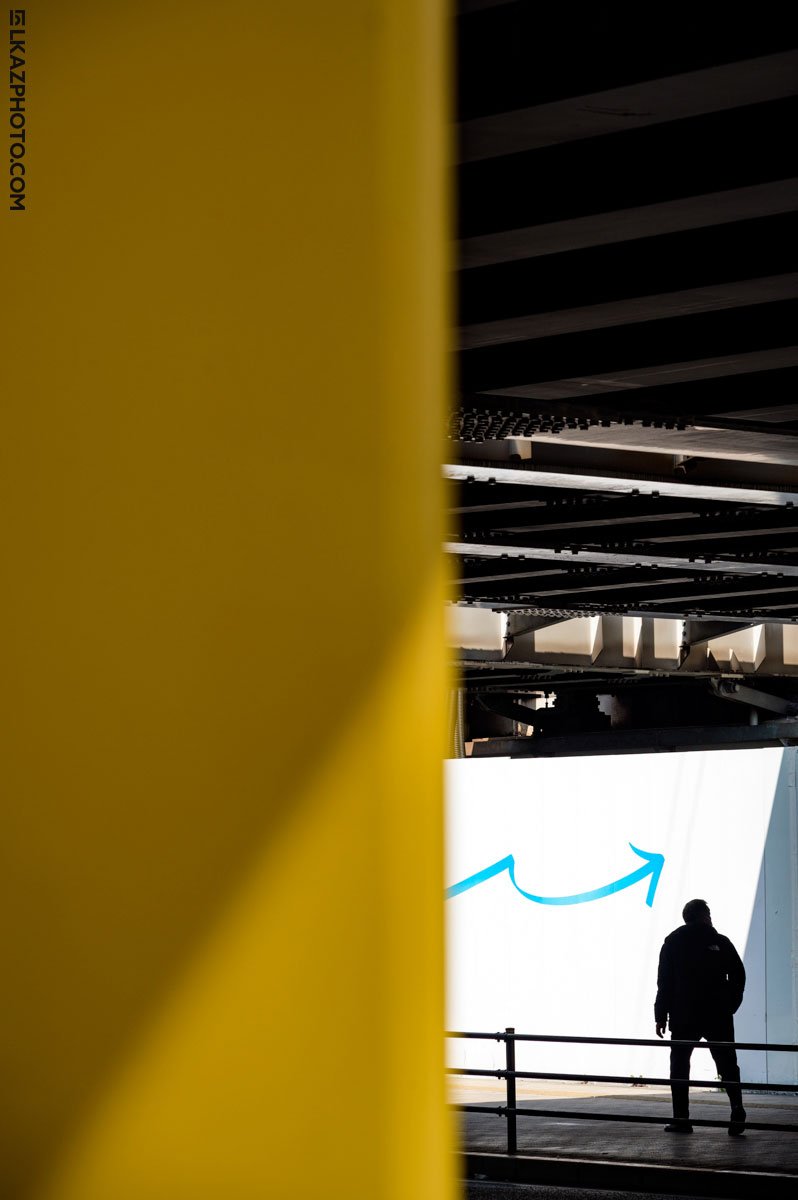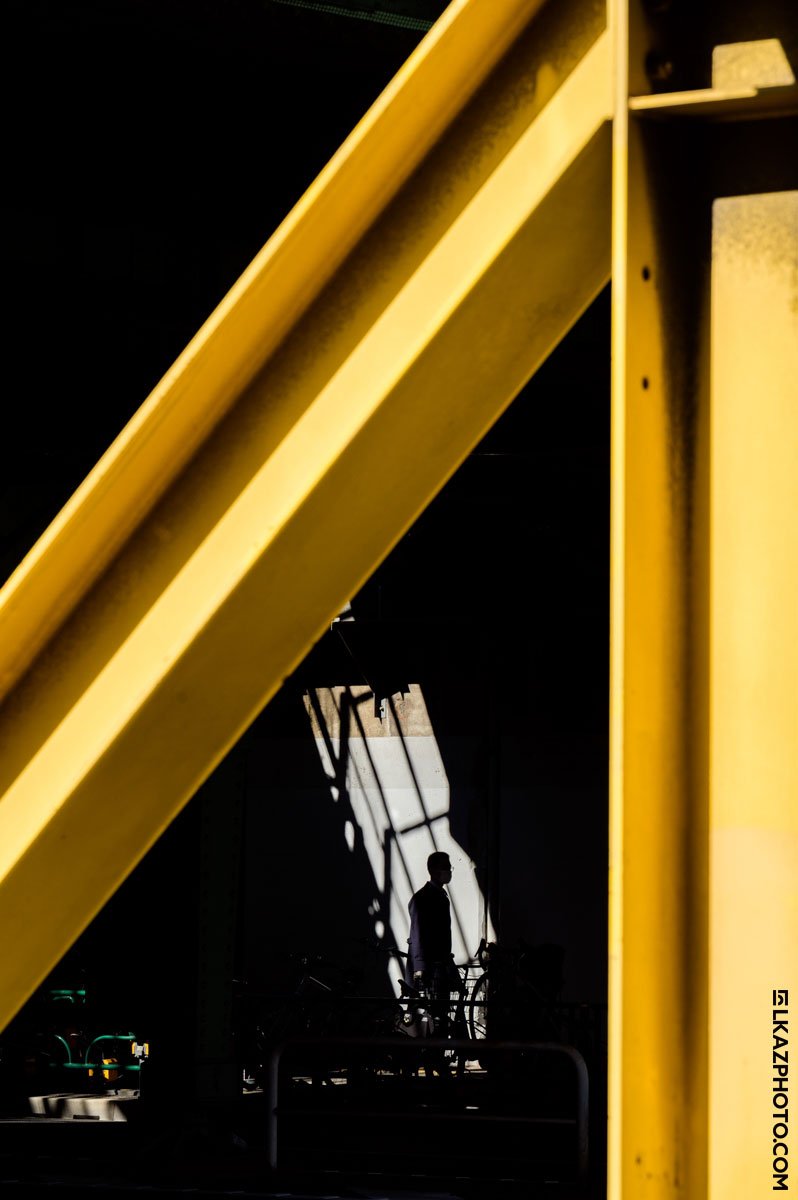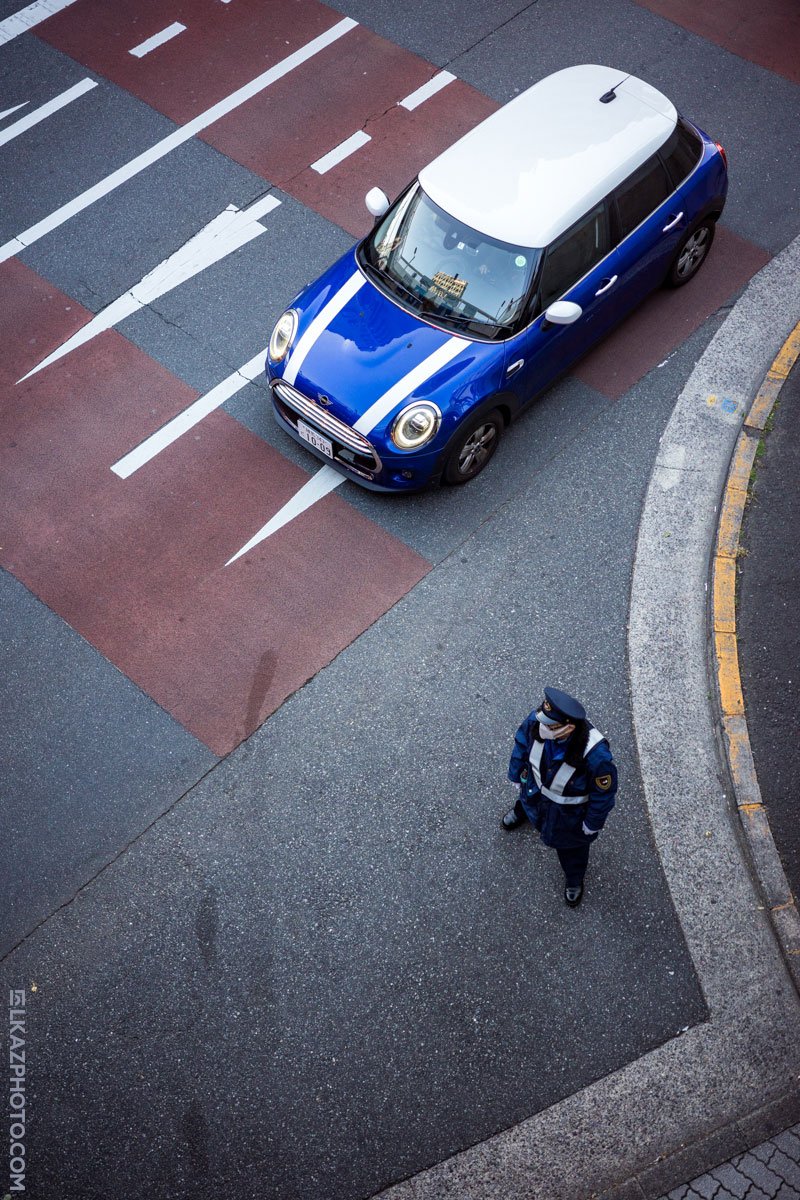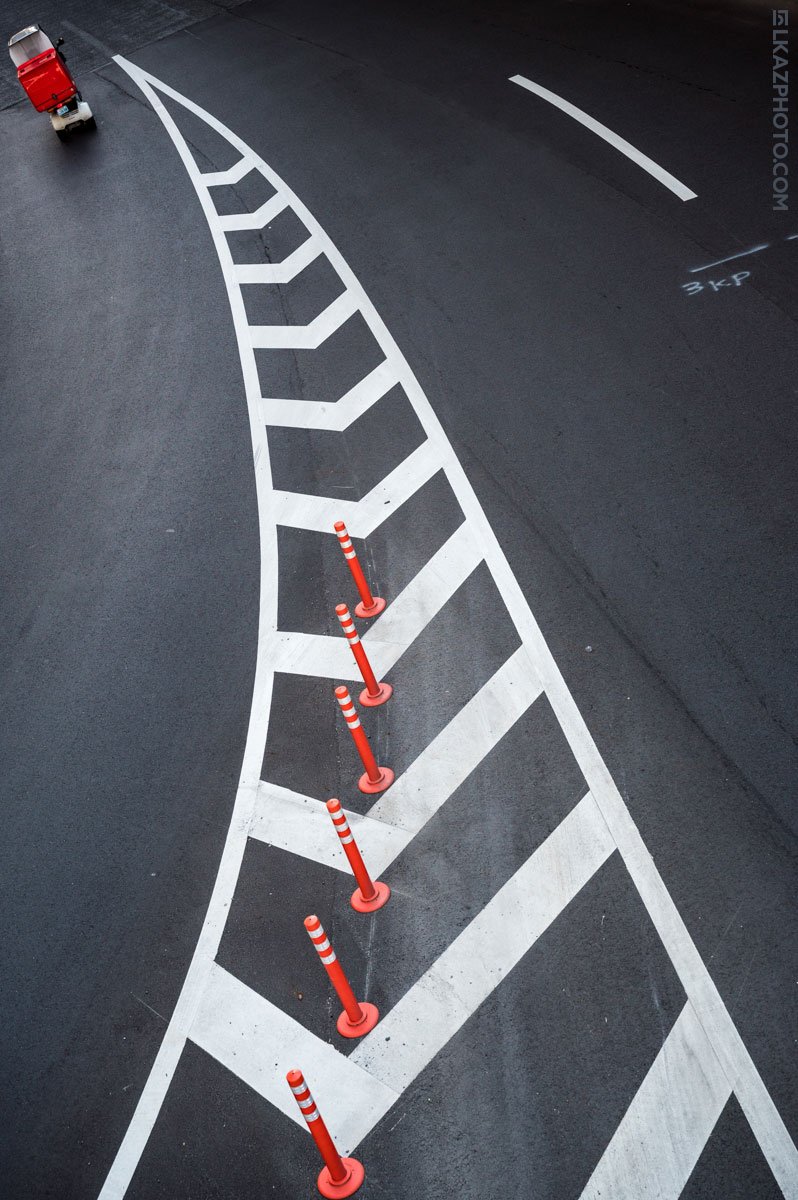Ikigai (生き甲斐) is a Japanese word that can be read literally as a “life’s worth” but can be more appropriately translated as the “purpose of one’s life.” The term seems to have been popularized in Japan in the mid-twentieth century, eventually making its way onto pop-science blogs and whatnot throughout the internet. Somewhere along the way it was broken down into four basic components that are often presented in a clever Venn diagram.
In our various pursuits and activities in life, there are four aspects that we can consider, and when all four are present they form an ikigai. An ikigai is something you love, you are good at (or are willing to become good at), which the world needs (in other words, doing good in the world), and with which you can earn a living (i.e., people are willing to pay you for it).
I want to discuss these aspects in the context of photography (since that is what I do) but I’m confident that the ideas that follow can be applicable for an artist in any medium, with the hope that some might be inspired to find their ikigai as well.
That Which You Love
When considering a purpose in life, we usually think of something we love to do. Passion for what we do is a common starting point for artists, but it can be a trap if it is all we pay attention to. Passion is a seductive thing, but passion for our work, without introspection, can lead us to a dead end. For me personally, photography quickly became a passion. It is an activity that is easy to love. It gets me out of the house and exploring my surroundings, and I enjoy it immensely. It would have been easy to stop there, but passion alone is merely a hobby. Our chosen preoccupation must offer a bit more to ourselves and to the word before we can call it our ikigai.
That Which You are (Willing to Become) Good At
Typically, if you spend enough time doing something, you will inevitably become at least somewhat good at it. For me it was so with photography. Without much time and effort, I learned the basics and began to feel that I am ‘good’ at photography. But as with passion, there are traps when it comes to mastery. Complacency is a common pitfall. After reaching an early plateau it’s easy to think, “ah that is good enough.” It can be intoxicatingly fun to hang out in your comfort zone with a creative skill like photography. This is why, I feel it’s not only matter of being good at something, as ‘good’ is a subjective appraisal of one’s own skill level. It can mean anything to anyone. Instead, a more universal approach is to always pursue mastery, and be willing to become ‘good’ with the understanding that there is no end to learning and improving. Good can always be better.
I also believe that without mastery, passion can only take us so far as artists. In my experience, no matter how much I love doing something, if it gets repetitive then I get bored and my passion fades. Luckily most artforms, photography included, can never be perfectly mastered. There is always room for improvement, something else to learn, a new avenue to explore, another challenge to overcome. The pursuit of mastery enforces the passion I have for my craft, as it’s in my nature to always seek to be better. I believe we must always hone our craft if it is to be our ikigai.
That Which the World Needs
While the first two components of an Ikigai are concerned with matters internal to the individual, the final two relate to how the individual is connected to society. For an artist to consider their work an ikigai, it must be something that the world needs. There is obviously a subjective moral question at play. The progress of our civilization has shown that humanity does not have a clear consensus on what the world needs. Still, we must consider if our activities do good in the world or not. For me personally, photography on its own does not do that much good in the world. In other words, I feel that the world does not need my photos to exist. Therefore, to consider my pursuits in the art of photography my ikigai I had to expand the scope of my work to include education.
Of course, I didn’t make a clever, conscious decision to do so. I just kind of fell into it. Back in 2014 I was approached by my now business partner. He asked me to help him create short photography workshops as a service for travelers coming to Tokyo. I was a bit skeptical, but I agreed. And I’m glad I did, as with time I realized how fulfilling this activity could be. Photography was no longer just about me having a good time exploring the city and making pretty pictures. I now had a way to give something to others that they truly valued. In essence, I was doing something that the world needs, not the whole entire great big blue world, mind you, just a tiny sliver of it—my niche. It may be a small contribution, but that is enough to give me the feeling that photography is my ikigai.
And how did I know that I was making a positive impact on people’s lives? It’s simple: they told me so. Feedback is an extremely important component of discovering what the world needs. We have to listen to the needs of others before we can satisfy them. In fact, feedback is a major component of teaching photography as well, but that’s a topic for another day.
I should also mention that because of major recent global events and their impact on international travel, I have not been taking people on very many photo adventures in recent years. As the situation dragged on, I became more and more despondent over a sudden lack of meaning in life. But in a sense, this is a positive realization, because it is proof to me that the ikigai concept is a practical description of purpose or meaning in one’s life. When a major component of my ikigai was suddenly wrenched away from me, I was much less happy and felt unfulfilled with my chosen activities in life.
Luckily, I was able to find a great alternative in the form of a YouTube channel about photography. Though I still prefer to teach photography to individuals or small groups in person, it’s nonetheless quite fulfilling to get these ideas out en masse via the internet. And once again, how do I know my tiny niche of the world needs my videos? People tell me so. Feedback is key!
That with Which You Can Earn a Living
And that brings us to money. The reality of our world is that most of us need to money to get the necessities for survival, and to that end we typically get a job. The thing is, according to everything I’ve explained above, it seems that 75% of our ikigai is determined by factors that are not always directly related to our jobs. We can spend much of our time on the activity that gives us the fulfillment of the other three components: our love of the thing, our pursuit of its mastery, and our ability to do good with it. Yet, if we ignore the last piece completely, we will be broke.
No one wants to be poor, but if we pursue a profession that is completely unconnected to our ikigai (that activity which fulfills the other three components), then we may introduce a lot of stress and unhappiness into our lives. I know, I know, this is the unfortunate reality for a lot of people. But as an artist I seek the financial opportunities that lie within my craft. Just as it is easy to be complacent with passion alone, it is even easier to be complacent with passion, mastery, and a vocation (doing good in the world), while eschewing financial gain. However, to me, it is not virtuous to be a starving artist, or worse yet, to live a double life—working a job one hates, only to come home fed up and tired and only then trying to get to work on what really matters. I know how this feels because I used to live exactly like this. So, I encourage all people, not only artists, to search deeply within themselves for an honest answer to the question: can I satisfy all four conditions in my work (passion, mastery, moral impact, and financial health) to discover my ikigai?
To give my own example, in the summer of 2014 I started doing photography workshops, but it wasn’t until late 2015 that I began to see the real possibility of doing it as a job. And even then, I knew it would be a huge risk to quit my decently paying full-time job and go into business with a partner on a venture that has no guarantee of success. To add to that risk, as a foreigner living in Japan, I am required to have a work visa, and the only way to keep one is to maintain employment. So, if I had quit my job, started a business and then the business failed, I would be left not only without a source of income, but also without a visa. On top of that, we had put up some capital as a stake in the business, so there was a financial risk as well. And yet, I took the leap. The driving factor was that teaching English as a second language (my job at the time) was simply not fulfilling. I was leading a double life. It was time to simplify things.
For the next few years, I made my living taking people on photo tours of Tokyo and teaching them photography. With running my own business came many responsibilities, but also a lot of flexibility. I was shooting a lot, and so I was able to continue mastering my craft. I would spend more time on building out my website and demonstrate my abilities to potential clients. That led to more freelance photography work. Since I had all four pillars of my ikigai in place there was a magnificent synergy. Photography is not merely a passion—for me it is life.
I should also add that money goes beyond being a means to survival. There something meaningful about the transaction from a customer to a creator. It denotes a sense of value. I feel that sometimes discussing money in the context of art is kind of taboo. But to me, paying for something is a concrete expression of one’s values. When someone pays for my service, they are not giving me little pieces of metal and paper. They are in fact trading in some of their time for mine. Time is the only commodity that we can truly call our own. For someone to give up their time for my time is a strong statement that what I am doing is worth something to that person. There is that word again… worth. To bring it back full circle, I remind the reader that ikigai can be translated as life’s worth.
To call my art my ikigai, it must have worth to me and to the society of which I am a member.
Finding Your Ikigai
So, I hope my ramblings have opened a door, asked a question, illuminated a first step. I do not offer an answer for you. I can only explain the concept as I understand it and share the story of my own journey towards my ikigai. I hope that these words lead to your inspiration and stimulate honest and genuine introspection of your own life and artistic pursuits in the context of an ikigai. I wish everyone luck on their own search of purpose!

